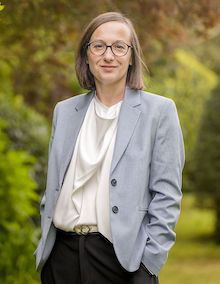Dans la même rubrique
Professeure

Ramona.Coman@ulb.be
+32 (2) 650 42 15



@ Institut d'études européennes
Av. F. D. Roosevelt 39 (bureau 3.302)
Bio
Je suis professeure de science politique à l'Université libre de Bruxelles, membre du CEVIPOL et membre affilié de l'Institut d'études européennes (IEE-ULB). Depuis 2023, je suis professeure invitée au Collège d'Europe à Bruges ainsi que membre de l’Ecole doctorale en science politique de la Faculté de Science politique de l’Université de Bucarest.
Née à Brasov, en Roumanie, j'ai obtenu ma licence en sciences politiques à l'Université de Bucarest (2001). En 2000, j'ai rejoint l'ULB en tant qu'étudiant Erasmus en sciences politiques. C'est à Bruxelles que j'ai découvert ma passion pour les études européennes après avoir suivi quelques cours à l'IEE-ULB. Après mon séjour Erasmus, j'ai obtenu une maîtrise en politique européenne à l'Institut de l'ULB, période pendant laquelle j'ai également été stagiaire Robert Schuman au Parlement européen. Après cette expérience extrêmement enrichissante, j'ai été nommée assistante en sciences politiques à l'ULB, où j’ai a entamé un doctorat en 2003. Je suis titulaire d'un DEA en sciences politiques de l'ULB (2004) et j’ai obtenu le titre de docteure en sciences politiques et sociales de cette même université en 2008. Ma thèse de doctorat (sous la direction du professeur Jean-Michel de Waele) portait sur les réformes de la justice en Europe centrale et orientale, avec un accent particulier sur la Roumanie. En 2008/2009, j'ai été boursière postdoctorale à l'Institut de recherche sur les systèmes judiciaires (IRSIG-CNR) à Bologne, en Italie.
J’ai eu l'honneur d'être présidente (2009-2023) et directrice (2014-2019) de l'Institut d'études européennes.
CV
- depuis octobre 2021 – Professeure en Science politique
- 2019-2023: Présidente de l'Institut d'études européennes
- 2014 - 2019: Directrice de l'Institut d'études européennes
- 2011 - 2014 : Vice-présidente du Département de Science politique, ULB
- 2011 - 2015 : Directrice adjointe du Centre d'étude de la Vie Politique (CEVIPOL)
- 2010 - 2013 : Présidente du Jury de la formation doctorale et d'admission au doctorat
- 2008 (sept) - 2009 (janvier), visiting researcher, Istituto di Ricerca sui Sistemi Giudiziari (IRSIG-CNR)/Bologna
- Mai 2008 - Docteur en science politique - Titre de la thèse: La carrière publique de la consolidation des garanties d'indépendance de la justice. Un phénomène social et politique dans la Roumanie post-communiste (sous la direction de Jean-Michel De Waele)
- 2003 - 2009 - Assistante en science politique, Faculté des sciences sociales et politiques/Solvay Brussels School of Economics and Management
- 2003-2004 – DEA en science politique, Université libre de Bruxelles
- 2001-2003 – DES en politique européenne à l'Institut d'études européennes (IEE), ULB
- 1997-2001 – Licenciée en science politique, Université de Bucarest
- CV complet
Domaines d'intérêt
- La contestation de la démocratie libérale avec un accent sur les acteurs (think tanks et partis politiques)
- L'impact du dissensus autour de la démocratie libérale sur le fonctionnement des institutions de l'UE et la capacité d'action de l'UE
- La politique et les instruments de l'UE en matière d'État de droit et leurs impacts nationaux
- Réformes judiciaires et mobilisation des juges
- Institutions de l'UE (Parlement européen, Commission, Conseil et Conseil européen)
- Dynamique des changements politiques/institutionnels
- Démocratisation et européanisation
- La circulation des idées libérales/illibérales dans l’UE
- Enseignements
-
POLI-D-409: Decision-making in the EU (MA level)
TRAN-O-610: Rule of law and mutual trust in global and European governance with Cecilia Rizcallah (MA level)
PhD Seminar on theory, methods and research in Political Science.
POLI-D-404 Séminaire de préparation au mémoire - Recherches
-
Depuis octobre 2022, je suis Principal Investigator du projet Horizon Europe “Responding to Emerging Dissensus: Supranational Instruments and Norms of European Democracy” (RED-SPINEL, 2022-2025) et coordinatrice académique du Joint Doctorate Network Marie Sklodowska Curie, GEM-DIAMOND.
Depuis octobre 2024, je coordonne avec prof. Paul Dermine le projet Mini Arc (ULB) intitulé ““Is the EU’s fiscal capacity transforming its member states? Insights from the Recovery Resilience Facility and Cohesion Policy?”
Parmi mes publications, je citerais The Politics of the Rule of Law in the EU Polity Actors, Tools and Challenges (2022, Palgrave Studies in European Union Politics) et le manuel Governance and Politics in the Post-Crisis European Union (2019).
- Travaux sélectionnés
-
Recent books :
Coman, R. (2022). The Politics of the Rule of Law in the EU Polity, Palgrave Studies in European Union Politics
Coman, R. Costa, O. and Sierens, V. (eds), EU Council Presidencies in Times of Crises, Palgrave, 2024.
Bickerton, Ch., Brack, N., Coman, R. & Crespy, A. (eds), Conflicts of sovereignty in contemporary Europe: a framework of analysis, Comparative European Politics, 2022.
Brack, N., Coman, R. & Crespy, A. (eds), Understanding Conflicts of Sovereignty in the EU, Routledge, London, New York, 2021.
Coman, R., Crespy, A. & Schmidt, V. (eds.) Governance and Politics in the Post-Crisis European Union, Cambridge University Press, 2020.
Coman, R., Fromont, L. & Weyembergh, A. (eds, 2019), Les solidarités européennes. Entre enjeux, tensions et reconfigurations, Larcier.
Vers DI-Fusion
